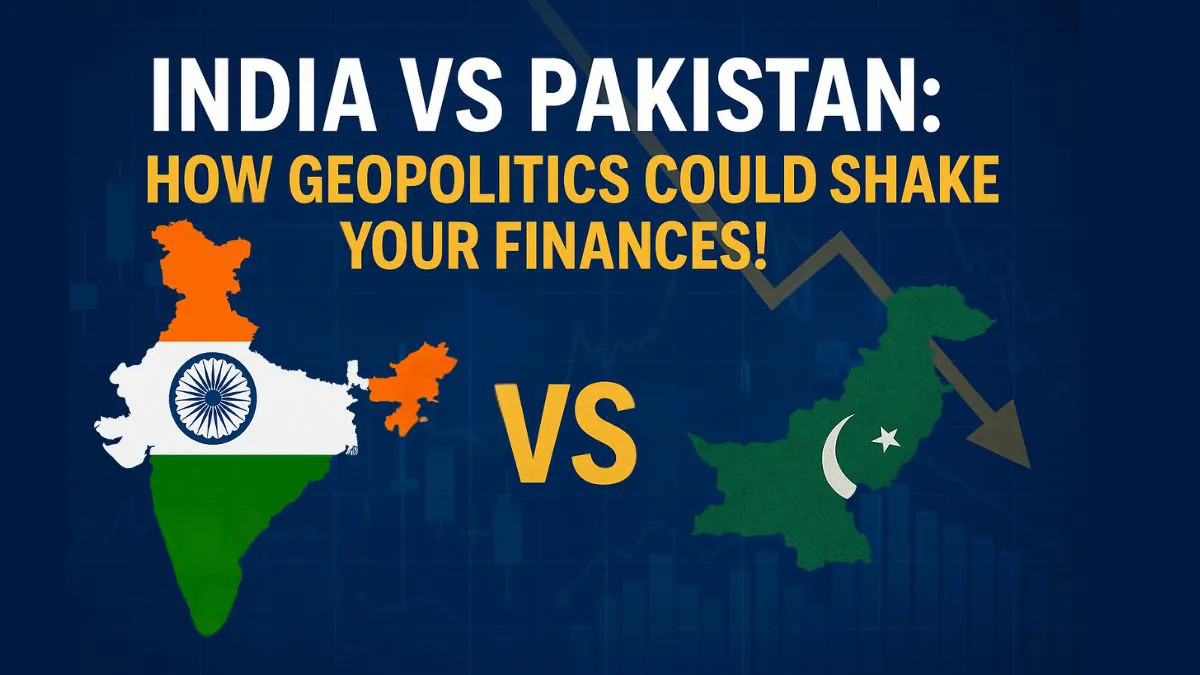How India-Pakistan Tensions May Affect Your Finances

Table of Contents
ToggleShare this article ↷
WellReturns is now on WhatsApp!
Get instant updates and expert tips.
The recent India-Pakistan tensions, sparked by the Pahalgam attack and Operation Sindoor in 2025, have left many Indians worried about their personal finances.
The conflict, sparked by a deadly attack in Kashmir, has led to military actions, trade bans, and diplomatic standoffs.
But what does this mean for your personal finance, investments, and the Indian economy? Let’s break it down in simple terms, with insights to help you navigate these difficult situations.
How India-Pakistan Tensions Affect Indian Stock Market and Investments
When India-Pakistan tensions rise, the stock market often feels the heat.
The Nifty 50 dropped 1.5% after the April 2025 Kashmir attack, with small- and mid-cap stocks falling over 3%.
Why? Markets hate uncertainty, and news of missile strikes, or border clashes makes investors jittery. Sectors like tourism, aviation, and hospitality take a direct hit.
For instance, Jammu & Kashmir’s tourism-driven economy is already seeing cancellations, affecting companies like Indian Hotels, which has limited exposure but still feels the pinch.
On the flip side, defence stocks like Bharat Dynamics and Solar Industries often see a boost due to increased government spending on ammunition.
Data from past conflicts, like the 1999 Kargil War, shows the Sensex rose 1.6% during the period, suggesting markets can be resilient if tensions don’t escalate into full-scale war.
However, short-term volatility is common, with an average Sensex correction of 7.5% during such episodes.
What to do? Don’t panic-sell your stocks. Markets often recover quickly if tensions cool down, as seen after the 2019 Pulwama-Balakot clash when the rupee stabilized.
Diversify your portfolio to include less volatile assets like gold or bonds to weather the storm.
Should You Change Your Portfolio During Geopolitical Instability?
The big question: Should you panic and rebalance your portfolio?
Geopolitical instability, like the current India-Pakistan tensions, can make you rethink your investments. But should you overhaul your portfolio?
Experts say, “Hold your horses!” India’s economy, now over $4 trillion, has minimal trade with Pakistan, so the direct impact is limited.
Citi analysts note that past tensions didn’t cause lasting damage to Indian financial assets, with bond yields spiking temporarily by 15 basis points before easing.
For the average Indian investor, the key is to stay calm and avoid knee-jerk reactions.
If you’re heavily invested in sectors like aviation (think IndiGo) or tourism, consider reallocating some funds to safer bets like FMCG or IT stocks, which are less affected by regional tensions.
The Reserve Bank of India emphasizes maintaining liquidity during volatile times, so keep some cash handy for emergencies. A balanced portfolio with 60% equity, 30% debt, and 10% gold can act as a safety net.
India-Pakistan News: What Investors Should Watch
Keeping an eye on India-Pakistan news is crucial for smart investing. Watch for updates on ceasefire agreements, like the one announced on May 10, 2025, which led to a sharp market rebound.
Diplomatic moves, such as India’s suspension of the Indus Waters Treaty or Pakistan’s airspace closures, can disrupt trade and aviation, affecting your investments.
Follow credible sources like the Ministry of External Affairs for accurate updates.
Also, monitor global reactions. The International Monetary Fund warned that Pakistan’s economy could face deeper instability, but India’s larger economy is better insulated.
If tensions escalate, keep tabs on oil prices and supply chains, as disruptions could spike inflation, impacting your daily expenses.

A prolonged India-Pakistan tensions could spell trouble for India’s economy. Increased defence spending, which rose to ₹6.21 lakh crore in the 2025 Union Budget, might divert funds from public services like healthcare or education.
This could lead to austerity measures, hitting the working class hardest. For example, during the Kargil conflict, India spent ₹14.6 billion daily, straining resources.
For personal finance, higher inflation from disrupted supply chains or oil price spikes could increase costs for essentials like fuel and groceries.
Small businesses near border areas, like in Punjab, face risks from closures and reduced trade. If you’re a salaried professional, tighter budgets might mean smaller pay hikes or job uncertainty in affected sectors.
Suspend Major Events, Activity, and More
The conflict has already disrupted daily life. The Indian Premier League suspended matches, and airports in northern India, like Kangra, shut down, cancelling over 430 flights.
If you’re planning travel or events, hold off until the situation stabilizes. For businesses, avoid risky expansions near border areas. Instead, focus on digital or southern markets, which are less affected, as noted by former official Subhash Chandra Garg.
Key Takeaways
- Stay Calm: India-Pakistan tensions cause short-term market volatility, but historical data shows quick recoveries.
- Diversify: Balance your portfolio with gold, bonds, and stable sectors like IT to reduce risks.
- Stay Informed: Follow reliable sources for updates on ceasefires or economic policies.
- Plan Smart: Postpone major financial decisions like travel or investments near border areas.
What’s your take on managing finances during these tensions? Share your thoughts below or ask for tips to stay financially secure!
Disclaimer
Well Returns is not a financial adviser. The content provided here is for informational purposes only and is intended to offer a brief overview and general knowledge. It is not a substitute for professional financial advice. Please consult a qualified financial adviser before making any financial decisions or investments.
Related FAQs
Tensions can cause short-term market dips, especially in equity funds. Diversify into debt or hybrid funds to reduce risk. Monitor news for de-escalation signals to time your investments better.
Gold is a safe haven during geopolitical unrest. With India-Pakistan tensions rising, allocating 10-15% of your portfolio to gold can protect against market volatility.
Keep an emergency fund in a liquid savings account, as advised by the Reserve Bank of India. Avoid locking funds in long-term investments until tensions ease, and consider fixed deposits for stability.






